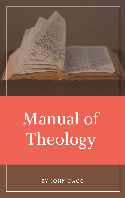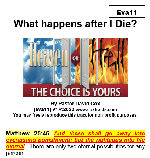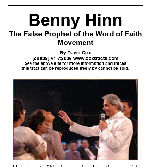Ads
The Fruit of a False Prophet Willfulness part 4
The Fruit of a False Prophet willfulness part 4
By David Cox
Summary: This study will investigate what the fruit (life and ministry) of a false prophet. Part 4 of this series is simply an introduction and begins by contrasting a man of God’s fruit (piety and holiness) with the false prophet’s fruit (sin, not doing God’s will).
For an overview of this, see
False Prophets and Teachers Overview
1Thess 5:20 Despise not prophesyings. 1Thess 5:21 Prove all things; hold fast that which is good. 1Thess 5:22 Abstain from all appearance of evil.
The “prophesying” are the preaching of God’s Word. Within that framework, hearing God’s Word preached and explained, we are to evaluate and esteem up or down each thing that is taught. We are to hold to that which is good in these preachings, implying that not all preachings that we will hear will contain 100% good things. But those good things we will recognize (if we have the right mindset when we hear it) and we are to hold fast to that good. We are also to abstain from all appearance of evil.
The difference between a man of God and a fraudster is that the man of God is worried about how things appear, and that they appear as pleasing to God (under how he understands God’s will). This means that “good presentation” is what he wants the world to see, and this holiness and piety should be elements that lead the unsaved to Christ.
1Cor 14:29 Let the prophets speak two or three, and let the other judge.
1John 4:1 Beloved, believe not every spirit, but try the spirits whether they are of God: because many false prophets are gone out into the world. 1John 4:2 Hereby know ye the Spirit of God: Every spirit that confesseth that Jesus Christ is come in the flesh is of God: 1John 4:3 And every spirit that confesseth not that Jesus Christ is come in the flesh is not of God: and this is that spirit of antichrist, whereof ye have heard that it should come; and even now already is it in the world.
Acts 17:11 These were more noble than those in Thessalonica, in that they received the word with all readiness of mind, and searched the scriptures daily, whether those things were so.
There should be a constant spiritual evaluation of what one is taught, and this evaluation is a comparison with the Word of God, the Bible. We readily receive and absorb all that is true to Scripture, and the rest we reject.
The false prophet builds confidence, often really preaching good stuff from the Bible. This is to build a trust in him so that his people will not analyze what is preached. They should just blindly accept as biblical everything that he says. This is how the Roman Catholic church began. The church at Rome ended up always being on the biblical side of the early church arguments, and at some point, they took the position, “whatever we decide in any discussion, since we are always right, you should just blindly accept it.” While on some issues a person or church may be right, on others they may not, and the evaluation process HAS TO ALWAYS BE CARRIED OUT!
2Thess 2:2 That ye be not soon shaken in mind, or be troubled, neither by spirit, nor by word, nor by letter as from us, as that the day of Christ is at hand. 2Thess 2:3 Let no man deceive you by any means: for that day shall not come, except there come a falling away first, and that man of sin be revealed, the son of perdition; 2Thess 2:15 Therefore, brethren, stand fast, and hold the traditions which ye have been taught, whether by word, or our epistle.
1Cor 14:29 Let the prophets speak two or three, and let the other judge.
There is a firmness that every Christian should be aware of. What he is taught should come directly from the Word of God, and he should not be readily “shaken” from those foundational doctrines of the Word of God. He should judge all things by Scripture that others would teach him, as well as his own conclusions and thoughts.
Not my will but thine
In previous studies we have seen that the delicate relationship of the minister and the will of God reveals much about whether he is a false prophet or a true man of God. A true man of God identifies himself as wanting to do God’s will as his very impulse, the beating of his heart, in the ministry.
John 5:30 I can of mine own self do nothing: as I hear, I judge: and my judgment is just; because I seek not mine own will, but the will of the Father which hath sent me.
John 4:34 Jesus saith unto them, My meat is to do the will of him that sent me, and to finish his work.
Jesus defined his mindset as being voided of self-will. His very “meat” is to seek God’s will and comply/complete with it. Food is funny, no matter how much you get of it, you are never satisfied. After a little while you get hungry and go back to searching for it. This is Jesus’ attitude towards the will of God. Even after doing God’s will, it forcefully comes back to his desire to again seek and obey, seek and obey. This is a driving dynamic in how a child of God should function. His own will gets totally lost in doing the will of God the Father.
Matt 7:21 Not every one that saith unto me, Lord, Lord, shall enter into the kingdom of heaven; but he that doeth the will of my Father which is in heaven.
Even salvation is defined as a person obeying God the Father. Note that we are to understand others as being brethren if they have the characteristic of seeking and doing God’s will. It is amazing how far off some ministers can actually go, and their people still just assume that they are saved, and great men of God. We see ministers that form whole ministries around their own wealth, and yet their people never put 1+1 together. We are commanded to not covet riches, yet they do it in front of us, and we still accept that they are “men of God”. Jesus never did that, and when our minister does that, he is not a man of God, but a minion of the devil.
Jude 1:16 These are murmurers, complainers, walking after their own lusts; and their mouth speaketh great swelling words, having men’s persons in admiration because of advantage. Jude 1:17 But, beloved, remember ye the words which were spoken before of the apostles of our Lord Jesus Christ; Jude 1:18 How that they told you there should be mockers in the last time, who should walk after their own ungodly lusts.
Jude is about identifying false prophets. One of the keys to recognizing a false prophet is very simply that they are willful, and their lives and ministries are strongly “stamped” with WHAT THEY WANT! They do not appear in any way fluid in God’s hands to do God’s will. They are great, and the church and people that are under their influence are going to be their slaves and that is the end of the story.
Look at people that don’t fit into that ministers great and almighty plans. What does he do with them? Typically they are marginalized, and then run off, or completely left out of the church’s affairs. There are two concepts here that we need to understand. (1) a false prophet is building an empire to himself, and he has no time nor interest in people that won’t cooperate with his plan. Emphasis on “his”. He has worked it all out, and God is using him to do what he wants. (2) a pastor is an under shepherd that takes care of the flock of God. The work of God is not a great outward work, but a caretaking of God’s sheep, all of them. A true man of God will tender and care for all of the people that God gives him, and they have a place with him simply because they are there. They remain an integral part of the church, even though they don’t necessarily go in or fit in with all the pastor’s plans.

Dagg Manual of Theology is a theology work in 2 volumes by J.L. Dagg a Reformed Southern Baptist. It is an extensive, very ample presentation of doctrines.
This is an extensive Bible Systematic Theology (Bible Doctrines book) from a conservative point of view.
Read/Download: now with pdf download link. 50,000 views on this page with download link






